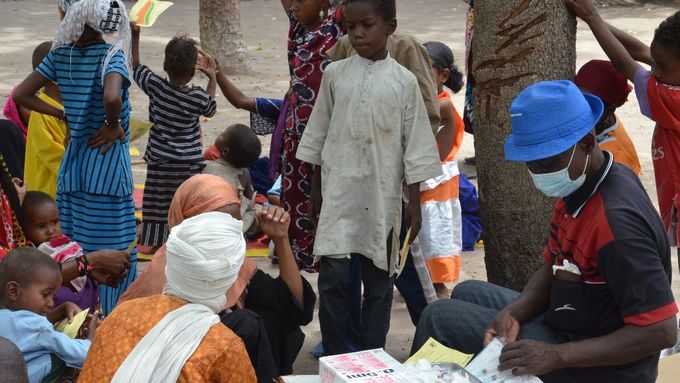Achieving Universal Health Coverage in Chad
08.05.2018
Universal Health Coverage (UHC) is crucial to ensure no one is left behind in terms of accessing health services. In collaboration with other donors, the Swiss Agency for Development and Cooperation implements the PADS project in Chad to support the Ministry of Public Health in its ambition to make UHC a reality. Swiss TPH, a partner of the project, participated at a workshop in N’Djamena last week to share experiences specifically on intersectoral synergies to help achieve UHC.

Ensuring healthcare workers are motivated, capacitated and well-equipped to reach the most remote communities is key to achieving UHC.
Reaching the poorest through Universal Health Coverage
As one of the world's poorest countries, Chad is mobilizing international efforts to work towards achieving Universal Health Coverage (UHC). The Projet d'appui aux districts sanitaires du Tchad - Yao et Danamadi (in short PADS) aims to improve access to essential healthcare services specifically for vulnerable populations.
"Quality services that are accessible and accepted are critical for progress towards UHC," said Boukari Ouedraogo, coordinator of PADS at Swiss TPH. "Quality and access are the door-openers for engaging communities, finding community champions for health, and putting greater equity into practice."
A lack of UHC results in sickness, human suffering and premature death of the poorest and impacts on society as a whole with negative effects on the workforce and education. UHC which is postulated by the World Health Organization and the UN Sustainable Development Goals would therefore bring substantial benefits to individuals, communities, and the society as a whole.
Intersectoral collaboration to improve access to healthcare
One important aspect to achieve UHC is to create synergies between the health and other sectors such as insurances, social action, economy, livestock and agriculture. In a workshop from 2 to 4 May in N'Djamena, national, regional and international stakeholders shared experiences and agreed on next steps to foster cooperation between sectors. "Intersectoral cooperation with the Ministries of Finances, Planning, Social Action and many more sectors is a key strategy of the Ministry of Health," said Djabar Hamid, General Secretary of the Ministry of Health in Chad.
Participants also discussed new opportunities on health insurance financing and the need for better data for financial and operational planning. "An example for a success story of intersectoral collaboration is the project on joint human and animal health services among mobile pastoral communities," said Damien Revault, Project Leader of PADS at Swiss TPH.
PADS - Reducing morbidity and mortality
The overall goal of PADS is to reduce maternal and child related morbidity and mortality with a specific focus on rural and nomadic populations. PADS applies a systemic approach including governance, infrastructure, drug supply, health information system strengthening, capacity building and outreach services including health promotion. The programme is also active at national level to inform evidence-based policy making.
The project is funded by the Swiss Agency for Development and Cooperation (SDC) and implemented by Swiss TPH together with the Centre de Support en Santé Internationale (CSSI) and other partners. The project contributes to Switzerland's involvement in the P4H Social Protection Network.
Contact

Damien Revault
Senior Project Leader
+41612848673
damien.revault@swisstph.ch
Stay connected
Subscribe to our newsletter and get all the latest research news, project updates, course and event listings from Swiss TPH.